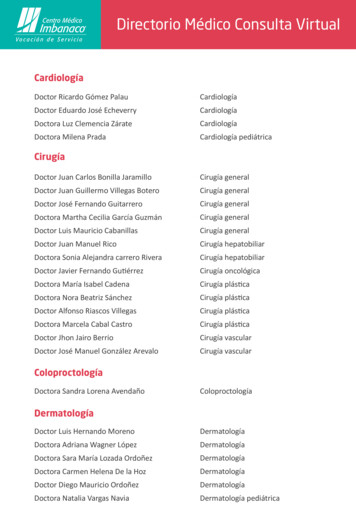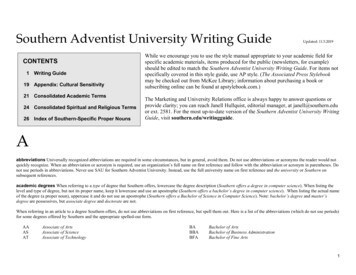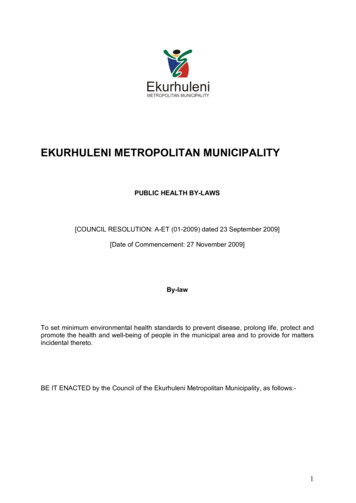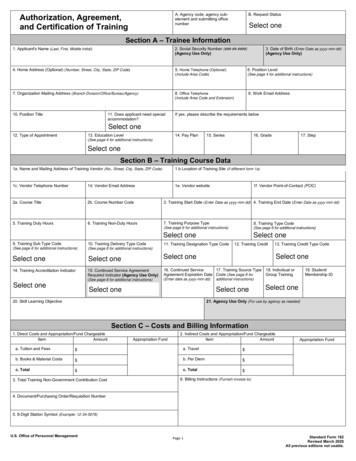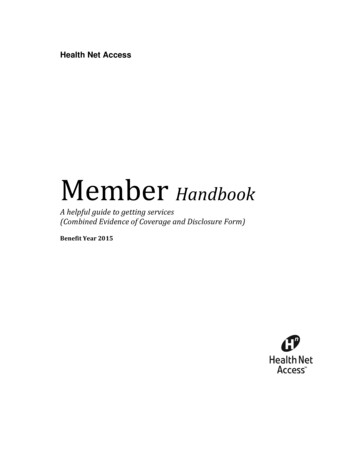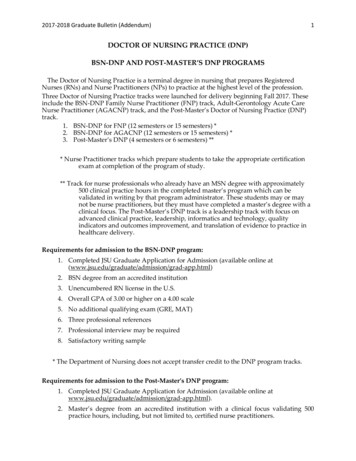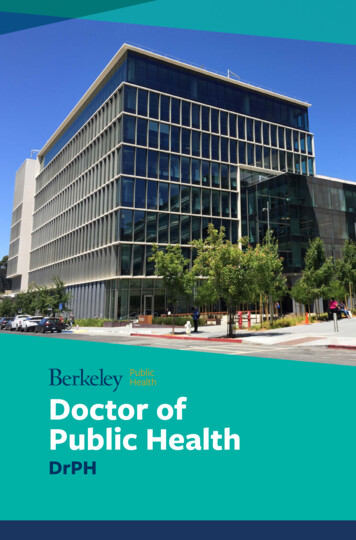
Transcription
Doctor ofPublic HealthDrPH1
TABLE OF CONTENTSI. DrPH ProgramIntroduction Mission Competencies Learning ObjectivesII. DrPH CurriculumPrerequisite Courses Required CoursesTimetable to Degree CompletionApproved Courses by Core and Breadth AreaStudent Checklist for Completion of DrPH MilestonesIII. DrPH Residency RequirementsPurposeResidency Requirements ProcessIV. DrPH Qualifying ExaminationPrerequisites OverviewConstituting the QE Committeedissertation prospectusOral ExaminationApplying for the QE Scheduling the QEFormat of the QEV. DrPH DissertationOverviewConstituting the Dissertation CommitteeAdvancement to Candidacy Dissertation GuidelinesFormat of the Dissertation ResourcesFiling the Dissertation2
DrPH ProgramI. DrPH ProgramINTRODUCTIONThe Doctor of Public Health (DrPH) degree is a professional degree conferred in recognitionof a candidate’s command of a comprehensive body of knowledge in the field of public healthand related disciplines and of the candidate’s proven ability to initiate, organize, and pursue theinvestigation of significant problems or interventions in public health.The focus of this degree is on the development of transdisciplinary knowledge about thedeterminants of health and the development of the scientific and professional leadership skillsneeded to translate this knowledge into effective health interventions.Those who earn this degree are expected to occupy leadership positions that have major influenceon public health research, policies, programs, systems, and institutions. Such leadership may be indiverse settings at the international, national, state, and local levels and in the public, private, andacademic sectors.MISSIONThe DrPH Program offers a unique opportunity to gain a breadth and depth of skills and expertisein research, policy, practice, leadership, theory, and new and emerging areas of public health. Themission of the DrPH degree program is to prepare students to develop transdisciplinary knowledgeabout the determinants of health, as well as scientific and professional leadership skills necessaryto translate this knowledge into strategic, successful, and effective health interventions. It is ourhope that students who earn this degree will advance to leadership positions in diverse settings atthe international, national, state, and local levels and in the public, private, and academic sectors.Through these leadership positions, our graduates will have meaningful and significant influence onpresent and future public health practice, research, policies, programs, systems, and institutions.COMPETENCIESUpon satisfactory completion of the DrPH curriculum, graduates will able to demonstrate thefollowing competencies:»» The ability to work cooperatively and collaboratively with scholars and practitionersfrom both academic disciplines and non-academic fields to develop and use innovativeconceptual and methodological approaches that synthesize and broaden disciplinespecific perspectives; integrate knowledge across disciplines, sectors and populations;work with community members to translate research findings into practice; and workwith researchers and other academics to bring the voices of community members to thedesign, development, and implementation of research agendas (Transdisciplinary andTranslational Research and Practice).»» The ability to apply multiple theoretical and methodological approaches to explore,describe, and analyze public health problems at an advanced level; synthesize and applyevidence-based research and theory from a broad range of disciplines and health-relateddata sources; initiate, organize, and pursue the investigation of significant problemsin public health practice, policy, and theory; and critically review relevant literature(Research Design and Methods).»» The ability to analyze issues and problems in public health; use critical evaluation, appliedresearch methodology, and statistical methods effectively; clarify, address, and analyze3
DrPH Program»»»»»»»»»»important gaps in scientific knowledge; propose alternative explanations for researchphenomena; and demonstrate critical thinking and mastery of concepts and theories inat least one area of concentration (Critical Analysis).The ability to identify, analyze, and discuss ethical principles; offer a clear understandingof how one balances the claims of personal liberty with the responsibility to protect andimprove the health of the population; develop and articulate an ethical framework; andapply the ethical concepts of social justice and human rights in public health researchand practice (Professionalism and Ethics).The ability to articulate a philosophy for professional leadership in public health;demonstrate leadership skills in public health practice; formulate and communicate ashared vision; advocate for important changes; inspire trust; and motivate others toachieve a shared vision (Leadership).The ability to compare and critique organizational and management theories,perspectives, and debates; apply organizational and management theories to developand test strategies to improve organizational performance in health care delivery, publichealth, and other health-related settings; evaluate and analyze the organizational andsystem factors that facilitate or impede the adoption of evidence-based interventions;and pose relevant research questions informed by theoretical and conceptual models inorganizational and management science (Program/Policy Management).The ability to identify, describe, and translate community and cultural issues that affectpeople’s lives and health; apply that understanding to design contextually-specificresearch, programs, and interventions; and utilize skills to conduct participatoryprocesses that engage diverse groups in communities in culturally relevant and sensitiveways in both research and practice (Community and Cultural Comprehension).The ability to articulate the breadth and depth of social, economic, and health inequitiesdomestically and globally that contribute to and influence health and health outcomesand to design, develop, evaluate, and implement multi-sector approaches that promoteprograms and policies related to the health of populations in diverse communities andcountry settings (Addressing Social and Health Inequities Domestically/Globally).These competencies are met through several programmatic requirements:1. Participation in all required and elective courses necessary for completion of DrPHdegree requirements as defined by the UC Berkeley School of Public Health facultyand the UC Berkeley Graduate Division. This coursework may include prerequisitecoursework based on the student’s previous academic activities. Prerequisite courseunits will not count toward the 48 units required for doctoral course work.2. Participation in a research residency or professional residency in a public health settingin which the student has the opportunity to advance knowledge and leadership skills,identify data for Dissertation research, conduct analyses, and participate in decisionmaking.3. Preparation for and completion of the Qualifying Examination to demonstrate thestudent’s knowledge, integration, and application of theory, methods, and substantiveknowledge in preparation for the Dissertation.4. Submitting a Human Subjects protocol which must be filed and approved by theCommittee for the Protection of Human Subjects on the Berkeley Campus prior toinitiating any Dissertation-related research.4
DrPH Curriculum5. Completion of a Dissertation that is designed to focus on the analysis and/or solution ofa problem or opportunity in public health practice.LEARNING OBJECTIVESGraduates of the DrPH Program will be able to achieve and demonstrate expertise in the followingmajor academic outcomes:»» Develop domain expertise and professional leadership skills in public health practice.»» Understand critical theoretical frameworks that shape social, economic, and healthinequities domestically and globally.»» Demonstrate substantive knowledge of relevant public health problems andinterventions sufficient to design and teach graduate level courses.»» Demonstrate ability to conduct rigorous quantitative research.»» Plan and conduct independent research using advanced research methods.»» Master academic and grant writing, conference presentation, IRB procedures, and ethicsin research.»» Foster cohesion and intellectual exchange among students and faculty across theuniversity to enhance interdisciplinary research and training.II. DrPH CurriculumPREREQUISITE COURSESThe minimum requirements for admission into the DrPH Program normally include an MPH orMaster’s degree from an accredited school of public health, or equivalent, and two years or moreof professional experience in public health (post-master’s degree) that demonstrate progressiveresponsibility and evidence of leadership potential. Some exceptions to the two- year post-master’swork requirement may be made under special circumstances. Students with a master’s or a higherdegree outside the field of public health and have not taken the following required courses orequivalent, during their MPH (or other relevant graduate program), will be required to take themduring the DrPH program, in addition to the minimum 48 units required for the DrPH.1.2.3.4.5.1PB HLTH 200J: Introduction to Health Policy & ManagementPB HLTH 200K: Introduction to Environment Health SciencesPB HLTH 200L: Introduction to Health & Social BehaviorPB HLTH 142: Introduction to Probability and Statistics in Biology and Public HealthPB HLTH 250A: Epidemiologic MethodsNOTE: Students may request to be exempted from a course if they can present evidence ofan equivalent course in their previous degree. If these courses are required, they must betaken for a letter grade during the first academic year and will not count towards the 48 unitrequirement for doctoral coursework.Students must receive a B- or better in the above core courses.5
DrPH CurriculumREQUIRED COURSES FOR STUDENTS ADMITTED BEFORE FALL 2019Students must complete a minimum of 4 full-time semesters of coursework (48 units not countingprerequisites for non-MPH students) and a minimum of 12 units of Dissertation research credits.In addition to the required core and breadth courses listed below, DrPH students are requiredto attend DrPH doctoral seminars offered in their first three years of study. Due to the diverseexperience each student brings to the program, it is expected that students will select courses andindependent study that advance their knowledge and ultimately their proficiency in all of the coreand breadth knowledge areas listed below. A wide array of courses are offered in these areas at theSchool of Public Health and in other departments on the UC Berkeley campus.CoreA minimum of one course is required in each of these areas:»» Management»» Leadership (Note: PB HLTH 293 does not count towards this requirement)»» Public Health EthicsBreadthA minimum of one course in two of these areas:»» Health Politics and Policy Analysis»» Public Health Interventions»» Environmental Health Sciences»» Global Health SciencesA minimum of two courses is required in this area:»» Research Design and MethodsREQUIRED COURSES FOR STUDENTS ADMITTED AFTER FALL 2019(Note that this set of requirements applies ONLY to students admitted for Fall 2019 and after.)Students must complete a minimum of 4 full-time semesters of coursework (48 units not countingprerequisites for non-MPH students) and a minimum of 12 units of dissertation research credits. Inaddition to the required courses listed below, DrPH students are required to attend DrPH doctoralseminars offered in their first three years of study. Due to the diverse experience each studentbrings to the program, it is expected that students will select courses and independent study thatadvance their knowledge and ultimately their proficiency in all of the core and breadth knowledgeareas listed below. A wide array of courses are offered in these areas at the School of Public Healthand in other departments on the UC Berkeley campus.Required courses:PB HLTH 290 Foundations in Public Health Leadership and PracticePB HLTH 205 Program Planning and Need AssessmentPH W200 Foundations of Public Health Practice (1st Semester)PB HLTH 375A Schoolwide Pedagogy course (1st Semester)6
DrPH CurriculumDrPH Curriculum Suggested areas to take courses in:Core»» Management»» Public Health EthicsBreadth»» Health Politics and Policy Analysis»» Public Health Interventions»» Environmental Health Sciences»» Global Health Sciences»» Research Design and MethodsREQUIREMENTS FOR ALL STUDENTSSecond Semester AssessmentEach spring, the student and his or her faculty mentor meet to discuss the student’s progress andreview courses taken and progress toward degree completion. A formal assessment form titled“DrPH Program Yearly Assessment” must be completed by the student and submitted to thementor for review and signature. The signed form will then be submitted to the Program Managerbefore the last day of instruction. Failure to complete this program requirement prior to thebeginning of the following semester may result in the student being placed on academic probation.Third Year Seminar RequirementAll students in residence in their third year (or beyond) are required to attend the DrPH Third yearseminar. Students on Filing Fee, conducting research out of the area for a sufficient amount oftime, or so close to filing that attendance would hinder their continued progress may be exemptedfrom this requirement this requirement with the approval of the Program Directors.Students may also opt out by enrolling in another doctoral seminar or by written approval of theadvisor and the Program Directors. All requests for an exception for the enrollment requirementmust be approved by the Program Directors.Specialty AreasSpecialty Areas are interdisciplinary, drawing faculty and students across many areas of study. Theyprovide a focus for substantive topics, reflecting the changing public health problems that mustbe addressed by public health practitioners and researchers. Students in the DrPH may elect tocomplete an additional specialty area as a minor in their curricula.The specialty areas have specific requirements. Please contact the DrPH program manager forfurther information regarding eligibility.AgingOne of the nation’s major public health objectives is to enhance and maintain the health,vitality, and independence of its aging population. The Specialty Area in Aging gives studentsthe opportunity to learn about these challenges.7
DrPH CurriculumGlobal HealthThe Global Health Specialty Area prepares students from different disciplines to work in globalhealth programs. Its objective is to produce graduates with a marketable set of skills for entrylevel professional jobs abroad, or with domestic agencies that conduct public health research,evaluation, and program development in other countries.Food SystemsThe Certificate in Food Systems responds to an escalating need to empower new leaderswith the capacity to create innovative solutions to pressing food and agriculture challenges.Building on UC Berkeley’s strength as a multi-disciplinary pioneer in food systems studies, theCertificate in Food Systems will prepare Masters and Doctoral students to think critically aboutthe multi-level, multi-system factors that affect food production, distribution, and consumptionlocally, nationally, and globally.Maternal, Child & Adolescent HealthThe field of maternal, child, and adolescent health aims to promote and protect the healthstatus and well-being of women, infants, children, adolescents, and their families. The Maternal,Child & Adolescent Health Specialty Area furthers this goal through excellence in training,research, continuing education, service, and advocacy.Multicultural HealthAs the U.S. population becomes increasingly multicultural, the Specialty Area in MulticulturalHealth prepares students to take a leadership role in addressing the challenges andopportunities afforded by these changing demographics.Public Health NutritionNutrition-related problems in the United States and globally need the expertise and leadershipof well-trained public health professionals. The Public Health Nutrition Specialty Area has beendeveloped to train a workforce with strong leadership skills and the competencies to addresscomplex issues and problems relating to public health nutrition.TIMETABLE TO DEGREE COMPLETIONThe DrPH program is a full-time program of study designed to be completed in four years.While it is possible to complete all requirements and write the dissertation for graduation in threeyears, this is unusual and requires that the student have available additional resources beforematriculation. While some students work part-time during the program, it is strongly encouragedthat any employment simultaneously further the student’s Dissertation progress. Given the shorttimeline of the program, students are not permitted to work full-time during enrollment in theprogram. Any students with deficiencies in coursework that covered the equivalent of the contentoffered by the MPH at UC Berkeley must take prerequisite courses in the first year of the programfor a letter grade.The DrPH academic requirements can be located in the Academic Progress Report in Calcentralunder My Academics Degree Progress Academic Progress Report provides guidance about whatcourses have already been approved by the faculty to count for satisfying the core and breadthrequirements. Students are encouraged to peruse course offerings across the university andpartner institutions (e.g. Stanford and UCSF) to find courses that further their academic interests.The DrPH Program Manager can provide a form that will allow students to petition to have acourse not listed on the Academic Progress Report be considered for credit. Please submit it alongwith a syllabus for the course as early as possible.8
DrPH CurriculumSTUDENT CHECKLIST FOR COMPLETION OF DRPH MILESTONESYEAR 1 Create a plan for completing pre-Dissertation requirements in two years and begincoursework. Complete the initial description of proposed research in the prospectus template andprepare a presentation on this material (for the Year 1 seminar) Identify and confirm residency placement Complete second semester review with faculty mentorSummer between Years 1 and 2 Complete residency requirementYEAR 2 Complete draft prospectusIdentify Qualifying Exam and Dissertation Committee Chairs and membersPresent prospectus to Year 2 DrPH seminarParticipate in Mock-Oral presentations in Year 2 DrPH seminar.Complete all required courseworkComplete oral Qualifying Exam (end of Year 2 or beginning of Year 3)Following the Qualifying Exam, submit to the DrPH program manager paperwork toadvance to candidacy. It should be signed by your advisor and the Head Graduate Advisorof your Designated Emphasis (if you have one). You should also submit a certification ofcompletion of CITI training if your research involves human subjects and a check for 90made out to the Regents of the University of California.YEARS 3 and 4 Complete Dissertation according to proposed prospectus and timeline Secure approval/sign off on the final Dissertation from Dissertation Committee Chair andmembers Submit Dissertation to Graduate Division Present final Dissertation findings to students and faculty as part of the Year 3 seminar9
DrPH Residency RequirementsIII. DrPH Residency RequirementsPURPOSEThe professional development of a DrPH student is central to the academic experience. Therequired structured involvement of the DrPH students in the community facilitates relevant,actionable translational research and is one differentiating feature of the DrPH from the PhDprograms. The Residency provides an opportunity for students to take on a significant professionalchallenge, to broaden their leadership perspective, and to explore research and career interests.RESIDENCY REQUIREMENTSIn preparation for the Dissertation and research phases of the DrPH Program, each student isrequired to complete a Residency. The Residency is a structured field experience with specifiedlearning objectives and outcomes that is to be completed in the summer between the 1st and 2ndacademic years. Exceptions may be granted based on the timing most appropriate to the student’sprofessional and research activities.The duration of the Residency must be adequate to meet the learning needs of the student.Students are required to complete a Residency of 320 hours (equivalent to eight weeks at 40 hoursper week). Exceptions may be granted based on concurrent experience related to the student’sresearch and professional goals. Even with an exception, in order to satisfy the basic requirementfor graduation, students must work at least 20 hours per week for 9 weeks at an approvedResidency site. Students requesting a placement of less than 320 hours, but more than 180 hours,must also demonstrate in a written letter that the hours under 320 that they are requesting tobe waived will be dedicated to meaningful progress on their career goals, skill development, orDissertation development in order to warrant approval. A formal Residency agreement must befinalized in the first two weeks of the residency.Exceptions to the timing and duration of the Residency must first be discussed with the student’sadvisor and the DrPH Program Directors. A formal written request for exception must besubmitted to the DrPH Program Directors by April 1 of the year in which the Residency is to beundertaken. Exception requests will be reviewed by the DrPH Program Directors and the student’sadvisor prior to submission. All comments and recommendations will be considered by the DrPHProgram Directors who will provide the final decision.The Residency activities are under the joint supervision of a designated Preceptor from theorganization sponsoring the Residency and the DrPH Field Residency Supervisor. The ResidencyPreceptor will be an experienced professional working with health issues with expertise inthe assigned project areas, experience and status within the organization, and an interestand competence in supervising and mentoring. The Preceptor will also share personal andorganizational values, experiences, and contacts with the student to facilitate a successful DrPHResidency.Students are required to register for the PB HLTH 297 course with the Field Residency Supervisorfor 3 units of credit in the Fall Semester following completion of the Residency to receive therequired academic credit for the Residency. The course will be taken on a S/U basis. The DrPHResidency process extends from the Fall Semester of the student’s first year through the FallSemester following completion of the Residency.10
DrPH Residency RequirementsPROCESSPre-Residency PlanningStudent will meet at least twice with the Field Residency Supervisor during the first year FallSemester to discuss career goals, research interests, and preliminary learning objectives for theResidency and to begin identification of potential Residency sites.Student will meet at least twice with Field Residency Supervisor during the first year SpringSemester to identify and finalize Residency site and Residency Preceptor and to reviewproposed learning objectives. The Residency site must be determined no later than April 1 ofthat year.Requests for exception from the Residency requirements must be discussed with the student’sadvisor and DrPH Residency Supervisor and must be submitted in writing to the DrPH ProgramDirectors by April 1 of the year the Residency is scheduled to be completed.Residency ActivitiesStudents will develop a draft Residency agreement for their placement by April 1 of the firstspring semester. Students will develop this in consultation with their Preceptor and the FieldResidency Supervisor.Students will finalize a Residency agreement during the first two weeks of the Residency inconjunction with the Residency Preceptor, with approval from the Residency Preceptor andthe Field Residency Supervisor. The Residency agreement incorporates organizational andstudent requirements (including learning objectives, planned activities, expected outcomes,and a timeline for achievement) Students will produce tangible products to demonstratecompetencies developed during the placement (i.e., grant application, research analysis,policy analyses, program plans, evaluation designs, and/or article for publication). These willbe retained by the Field Residency Supervisor as part of the student’s record. Students willcomplete an evaluation of the Residency process (similar to a course evaluation) and providefeedback on the Residency site and Preceptor.The Preceptor will be asked to provide formal feedback on the student’s performance at themidpoint and the completion of the Residency. When feasible, the Field Doctoral ResidencySupervisor will make a visit to the Residency site mid-way through the Residency to meet withthe Preceptor and student to monitor progress on the learning objectives and other elementsof the Residency agreement. This travel will be dependent on the availability of travel funding. Iftravel funding is limited, a formal evaluation will occur as necessary through a conference call.Post-Residency ActivitiesStudents will register for Summer Residency units (PB HLTH 297 – Instructor is the FieldResidency Supervisor) in the Fall Semester following the Residency. Students will meet with theField Doctoral Residency Supervisor during the first month of the Fall Semester following theResidency to review the work/research products of the Residency and debrief on the Residencyexperience.11
DrPH Qualifying ExaminationIV. DrPH Qualifying ExaminationPREQUIRESITESTo be eligible to take the Qualifying Examination, a student must:1. Be registered for the semester in which the exam is taken or, during the winter orsummer break, be registered in either the preceding or the following semester;2. Have completed at least one semester of academic residence;3. Have at least a B average in all work undertaken in graduate standing;4. Have no outstanding grades of “Incomplete”;5. Have satisfactorily completed all DrPH breadth and core requirements(if admittedbefore Fall 2019), have satisfactorily completed all DrPH course requirements(if admittedafter Fall 2019),OR be completing these requirements by the end of the same semesterwhen the orals exam is taken.OVERVIEWThe DrPH Qualifying Examination has two components: (1) preparation of a detailed writtendissertation prospectus and (2) an oral examination of the student’s depth and breadth ofknowledge in his or her defined areas of expertise. The dissertation prospectus must be approvedby the Dissertation Committee Chair prior to taking the oral examination. The prospectus mustalso be reviewed by each member of the Qualifying Exam committee at least once prior to theoral examination. Once the prospectus has been approved, it should be submitted to the DrPHProgram Manager to be added to the program’s prospectus library.For the Qualifying Exam, students will define, in consultation with committee members, threefield areas of expertise for examination that constitute areas of knowledge needed for successfulcompletion of their Dissertation project. These areas must be approved by the QualifyingCommittee Chair. The student should then ensure that there is at least one exam committeemember who is qualified to test the student in each of these areas of expertise.CONSTITUTING THE QUALIFYING EXAM COMMITTEEThe student should consult with his or her Faculty Advisor concerning appropriate members of thefaculty to serve on the Qualifying Examination Committee and take into account Graduate Divisionregulations on committee appointments (summarized below). Committee members should beselected to represent three areas of expertise relevant to the student’s proposed research as wellas the broad scope of Public Health. The student is expected to speak directly with prospectiveExamination Committee members about their willingness to serve and to define their three fieldareas.The student will apply for the Qualifying Examination through Calcentral in My Dashboard StudentResources Higher Degree Committee Form. The students’ proposed Qualifying ExaminationCommittee will be reviewed by the Program Manager prior to submission to the Dean of theGraduate Division for approval. The Graduate Division will notify the student, the members of thecommittee of their official approval of the committee to conduct the Qualifying Examination.12
DrPH Qualifying ExaminationGraduate Division Requirements for Faculty Membership on Qualifying ExaminationCommittees»» The Qualifying Examination Committee is composed of four faculty members: a chair, anAcademic Senate representative from outside the School of Public Health, and at leasttwo additional members.»» The Chair of the Committee must be a member of the Berkeley Academic Senate fromthe School of Public Health. (Senate members include individuals with the followingtitles: Professor, Associate Professor, Assistant Professor, Professor Emeritus, Professorin Residence, University Professor, Senior Lecturer with security of employment,and Lecturer with security of employment.) The faculty member who will chair theDissertation Committee cannot serve as chair of the Qualifying Exam.»» The UC Berkeley Academic Senate representative must be chosen from outside of theSchool of Public Health. This person ensures that the committee is conducted in a fairand professional manner.»» The Additional Members must be chosen and added such that at least half of thecommittee members are from the Berkeley Division of the Academic Senate in theSchool of Public Health. Other members may be Berkeley Academic Senate members inanother degree granting program or approved non-Academic S
The DrPH Program offers a unique opportunity to gain a breadth and depth of skills and expertise in research, policy, practice, leadership, theory, and new and emerging areas of public health. The mission of the DrPH degree program is to prepare students to develop transdisciplinary knowledge
